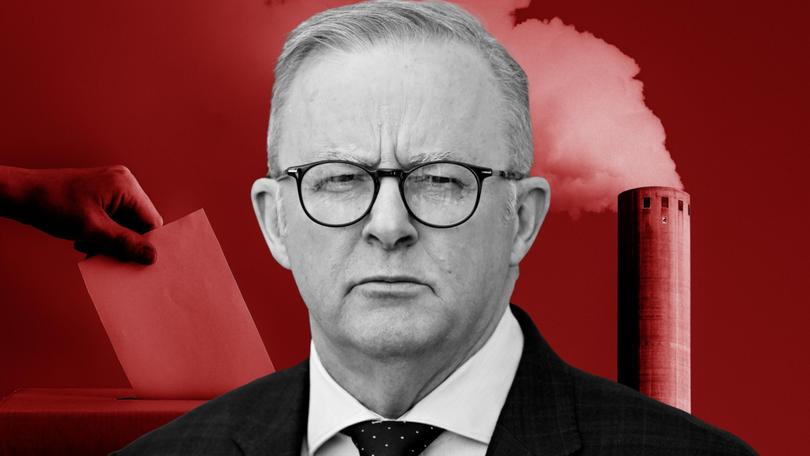ANDREW CARSWELL: Voters won’t get a say on Australia’s climate plan. But they’ll still pay the price
ANDREW CARSWELL: Do Australians want to address climate change? Yes, of course. Duh! Do they want to pay for it? Pass the peanuts. Now they actually know they’re paying for it. They feel it.

We were told to expect a 2035 emissions reduction target that would be “ambitious” but “achievable”.
Instead, all we got was an “adjournment”.
Once passionately committed to tackling “the greatest moral challenge of our time”, the Albanese Government seems certain to delay setting its official 2035 target until after the next election, ignoring the international deadline for such pronouncements.
Sign up to The Nightly's newsletters.
Get the first look at the digital newspaper, curated daily stories and breaking headlines delivered to your inbox.
By continuing you agree to our Terms and Privacy Policy.Despite hounding his fellow G20 leaders 12 months ago to take “urgent, comprehensive action” to address the climate crisis, we now have neither urgency nor a comprehensive plan from Prime Minister Anthony Albanese to tackle climate change beyond Australia’s current commitments. For better or worse.
Pressed on his sudden climate hesitance during an interview with the ABC’s Insiders host David Speers on Sunday, Albanese danced around the question with such sharpness that it laid bare the truth.
Asked when his Government would announce a 2035 target, Albanese replied: “Sometime next year.”
Speers: “Before the election?”
Albanese: “Our focus is on achieving the 2030 target.”
This is far from a rethink on climate policy, nor an adjustment based on the growing understanding that current climate policy has failed to bring down emissions and only resulted in sending electricity prices into low orbit.
No, you are still going to get the whole shebang: a formidable 2035 emissions target that will put unprecedented pressure on the economy and households to transition to clean energy at warp speed, whatever the cost or level of disruption. A target designed to keep face with “friends” such as the UK which last week etched a 81 per cent emissions target on the 2035 leader board.
Oh it’s coming.
You just won’t get to vote on it. Labor doesn’t want you to vote on it.
It’s a secret, and damned if they are going to tell you about it before you enter that ballot box.
This deception is the offspring of politics governed by fear. Where core values and principles, once loudly proclaimed from the rooftops and used as a blunt weapon against less ambitious opponents, are now discarded or postponed without hesitation in the pursuit of electoral success.
There is now a genuine fear within the Government that dramatically increasing Australia’s commitments on emissions reduction, on the eve of an election fought on cost of living, with voters in a tremendously febrile mood, would be tantamount to suicide.
At the heart of this stands a Prime Minister who is afraid to gamble his political future on his once unashamed personal ambition for more aggressive climate action.
He is caught between the moral imperative of climate leadership that has underpinned his time as Labor leader, and the grim reality of electoral survival.
He is choosing survival.
Labor can afford to take such a sleight of hand on climate ambition this close to an election because of weakening support for the Greens, following a year of denigrating Jews, inciting hatred and parliamentary obstructionism. It just isn’t leaking primary votes to the left as it was 12 months ago. It is leaking them to the Coalition.
Albanese has also clearly sensed a shift in public sentiment. A whiff of climate change exhaustion. A disillusionment with the process that appears plagued by politics and parochialism, rather than balanced objectives and outcomes.
It’s not that Australians have abandoned their belief in the need to address climate change — far from it. It remains a prevailing view, albeit with varying degrees of enthusiasm and urgency. It is still a priority of the people.
It’s just that the people can’t quite afford their electricity bills right now.
Short term financial survival is trumping any sense of altruism, and is leading Australians to finally reconcile that the need to act on climate change comes with an actual personal cost, one that is compounded by governments which execute policy poorly or overreach.
Pollsters have been warning about this for years.
Do Australians want to address climate change? Yes, of course. Duh!
Do they want to pay for it? Pass the peanuts.
Now they actually know they’re paying for it. They feel it.
This realignment began to emerge earlier in the year. In February, the Guardian’s Essential poll revealed a striking milestone: for the first time since the survey’s inception, more Australians felt the country was doing enough on climate change than those who believed greater action was needed. The gap widened in the latest poll, released today, which showed 37 per cent of respondents believed we were doing enough, compared to 33 per cent who said we should do more.
They were tapping the brakes 10 whole months ago. Has pressure on households eased since? Have electricity bills retraced? Has the risk of power blackouts receded?
It’s not a surprise Albanese is stalling — waiting for a safer political moment, concealing his true intentions from an unsuspecting public.
But that doesn’t make it any less galling.
The question is whether this game of smoke and mirrors harms Brand Albo more than hog-tying the economy to unrealistically high targets during a cost-of-living and energy crisis.
Because even if climate-fatigued voters initially accept this climate delay as a rethink, there’s one thing worse than a political leader sacrificing their values for political expediency.
One who deceives the public.
Andrew Carswell is a former adviser to the Morrison government
